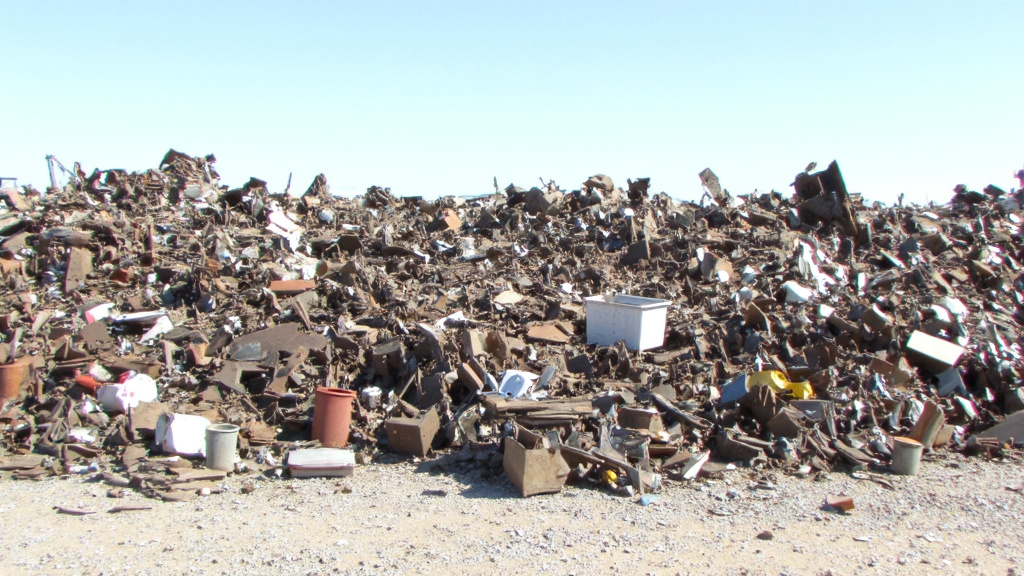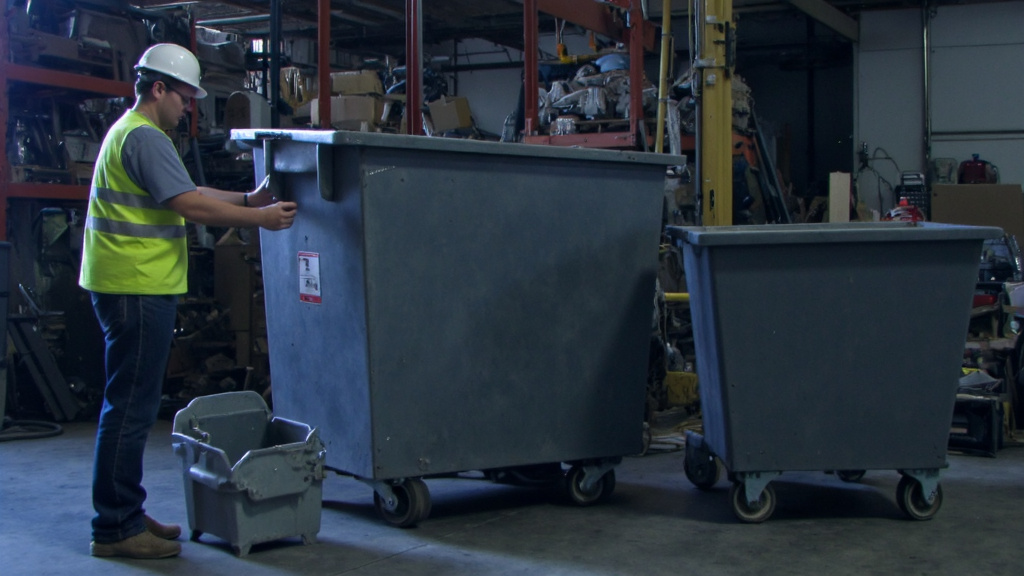5901 Botham Jean Blvd, Dallas, TX 75215
What Are Scrap Metal Collection Bins?
May 7, 2025Scrap metal collection bins are vital to modern industrial waste management. These durable, purpose-built containers offer secure storage and transport solutions for various metal waste materials generated in manufacturing and construction.
Industrial facilities depend on these robust containers to organize metal recycling processes. Designed to withstand heavy loads and harsh conditions, they help prevent workplace hazards. Their structural integrity ensures metal scraps remain contained, reducing environmental contamination risks.
These specialized containers are available in multiple configurations to meet different operational needs. Roll-off containers offer large-capacity solutions for substantial volumes of scrap. Tilt hoppers provide ergonomic dumping capabilities for easier material handling. Self-dumping bins enhance efficiency for businesses with regular metal waste disposal requirements. The metal recycling industry continually adapts these container designs to meet the evolving demands of sustainability-focused industrial partners.
What Types of Scrap Metal Bins are Available?

Scrap metal recycling operations use various specialized containers to efficiently collect, store, and transport materials. The right bin type depends on your facility size, material volume, and handling equipment.
Industrial forklift bins are common solutions for factory floors and manufacturing facilities. These bins typically come in 4′ x 4′ and 4′ x 6′ configurations. Their mobility allows for strategic placement throughout production areas where scrap regularly accumulates.
Yard containers offer larger capacity for outdoor storage at recycling centers or industrial sites. These durable containers withstand harsh weather conditions while securing valuable metals from theft or displacement.
Roll-Off Containers for Large Volume Operations
Roll-off containers provide maximum capacity for substantial scrap generation. Available in sizes up to 40-yard capacity, these containers accommodate demolition projects, construction sites, and major industrial operations.
The 30-yard and 40-yard roll-offs excel at handling structural steel components, large equipment parts, and bulk metal waste. Their design allows for efficient loading with heavy equipment and straightforward transportation to processing facilities.
For operations with limited space but high volume needs, compactors offer an excellent solution. These machines compress metal waste to maximize storage capacity in confined areas. The compaction process reduces transportation frequency and associated costs.
Specialized Bin Features for Enhanced Performance
Modern scrap metal bins incorporate innovative features to address industry-specific challenges. Smooth gravity drain systems represent a significant advancement in bin technology. These specialized containers prevent residual oils and fluids from leaking onto factory floors.
The gravity drain design channels liquids away from work areas, improving safety conditions and reducing cleanup requirements. This feature is particularly valuable in automotive, manufacturing, and machine shop environments where oily scrap is common.
Self-dumping hoppers streamline the waste transfer process. These containers feature a balanced design that allows for easy emptying with a forklift. A simple locking latch mechanism secures the load during transport and releases for controlled dumping.
Many suppliers offer both lidded and open-top configurations depending on material security needs and environmental considerations. Lidded options protect valuable scrap from theft and prevent water accumulation in outdoor settings.
| Container Type | Applications | Features |
|---|---|---|
| Roll-off Containers | Large-scale operations, demolition projects, construction sites | High capacity (up to 40-yard), efficient loading and transport |
| Tilt Hoppers | Manufacturing facilities, shop-floor collection | Ergonomic dumping capabilities, easy material handling |
| Self-dumping Bins | Regular metal waste disposal, industrial settings | Balanced design, simple locking latch mechanism |
| Yard Containers | Outdoor storage at recycling centers, industrial sites | Weather-resistant, secure metal storage |
| Compactors | Operations with limited space, high volume needs | Compress metal waste, maximize storage capacity |
Custom fabrication services address unique operational requirements that standard containers cannot meet. On-site fabrication teams can design and build bins with specific dimensions, reinforcement, and features tailored to unusual materials or handling methods.
For businesses with fluctuating scrap volume, flexible delivery and pickup schedules maintain efficient operations. Many recycling companies offer both scheduled service and on-demand container exchanges to prevent overflow situations or unnecessary container presence.
What are the Benefits of Using Scrap Metal Collection Bins?
Scrap metal collection bins revolutionize waste management for businesses by streamlining the recycling process. These specialized containers establish designated collection points throughout facilities, removing the need for employees to sort through mixed waste. By offering clearly marked bins for different metal types, companies simplify recycling and maximize material recovery.
Cost savings are a major advantage of implementing scrap metal collection systems. Instead of paying disposal fees for metal waste, businesses can sell these materials to recycling facilities, creating new revenue streams. Many manufacturing operations report significant reductions in waste management expenses after adopting dedicated collection programs.
Environmental impact reduction is another benefit when businesses utilize proper collection bins. Industry data shows that recycling one ton of steel reduces greenhouse gas emissions by 2.1 metric tons of carbon dioxide equivalent. This significant decrease helps companies meet sustainability goals while improving their environmental footprint in the communities where they operate.
High-capacity bins enable efficient processing of large material volumes, making them ideal for industrial settings. These containers handle substantial amounts of surplus metals, electronics, and certain plastics, keeping valuable recyclables in the production cycle. For manufacturing facilities generating significant metal waste, these bins offer practical solutions for material management.
Operational efficiency improves with strategic bin placement. By positioning collection containers near work areas where scrap is generated, businesses minimize transportation time and reduce the likelihood of improper disposal. This approach increases employee participation and ensures cleaner material streams for recycling.
Workplace organization improves when dedicated collection systems replace ad-hoc waste management. Scrap metal bins create cleaner, safer work environments by reducing clutter and preventing hazardous materials from accumulating in inappropriate areas. This organization enhances workplace safety and boosts overall productivity.
Enhancing business reputation is an often overlooked benefit of visible recycling programs. Companies that demonstrate environmental responsibility through visible collection systems attract environmentally conscious customers and partners. In today’s sustainability-focused marketplace, these practices can provide meaningful competitive advantages.
Partnering with specialized recycling companies eliminates the need for bin procurement, storage, and maintenance. These service providers typically manage all aspects of the collection process, from container delivery to regular pickup schedules. This turnkey approach allows businesses to focus on their core operations while maximizing recycling benefits.
How to Choose the Right Scrap Metal Bin for Your Needs?

Selecting the right scrap metal bin involves considering several key factors. The type and volume of scrap your operation generates will determine the most suitable bin. A manufacturing facility producing large metal sheets requires different solutions than an automotive shop collecting smaller parts.
Start by assessing your average weekly scrap volume. This calculation helps avoid choosing bins that are too small, leading to overflow, or oversized containers that waste space and resources.
Available space at your facility is crucial in bin selection. Measure your designated storage area before committing to any bin size. Consider both the footprint and height clearance needed for safe placement and collection.
Bin Size Options for Different Operations
For smaller operations with limited scrap output, compact plastic bins often suffice. These bins typically handle workshop-level scrap without occupying excessive space. Businesses with moderate scrap production might consider medium-sized plastic skip bins, balancing capacity with manageability.
Larger industrial operations usually require substantial metal containers. Standard bin sizes include 10, 20, and 30 cubic yard options. A 10-yard bin suits smaller businesses or those with space constraints. The 20-yard size is ideal for medium-volume operations, while high-volume facilities often need 30-yard bins to manage substantial scrap output.
Consider what materials your bin will contain. Heavy metals require more durable containers than lighter aluminum scraps. Some materials may also need specialized containment for environmental compliance.
Industry-Specific Requirements
Different industries have unique scrap containment needs. Construction sites typically require large, durable bins that can withstand rough handling and heavy loads. Manufacturing facilities often need specialized containers for specific production waste types. Automotive repair shops may benefit from bins with compartments to separate different metal types.
Collection frequency also influences bin selection. Operations with daily scrap accumulation require different solutions than those with weekly or monthly collection schedules. Work with your recycling provider to establish a collection timeline that aligns with your production patterns.
Environmental regulations also factor into bin selection. Certain scrap materials face strict disposal regulations. Ensure your chosen bin complies with local environmental and safety laws to avoid fines or penalties.
Many recycling providers offer custom-built bins tailored to unique operational requirements. These specialized containers can significantly improve scrap management efficiency by addressing specific challenges in your workflow.
Quality and Durability Considerations
Always prioritize bin durability. Industrial scrap bins should withstand heavy loads and harsh conditions. Look for bins made from high-quality materials like heavy-duty steel to minimize damage risk and ensure a longer service life.
Your recycling partner should provide guidance throughout the selection process. Reputable providers will help assess your needs rather than simply selling the largest option. They should consider your space limitations, material types, and volume requirements.
Consider future growth when selecting bin size. If your operation expects to expand production soon, choosing a slightly larger bin now may prove more economical than upgrading later.
Finally, ensure your bin has proper safety features. Look for containers with secure lids to prevent unauthorized access. Check that loading heights are appropriate for your staff and equipment to minimize injury risks.
| Bin Type | Dimensions (L x W x H) | Application |
| #12002 | 48″ x 42″ x 48″ | General scrap collection |
| #12104 | 72″ x 48″ x 48″ | Large volume ferrous and non-ferrous scrap |
| #12200 | 84″ x 48″ x 48″ | High capacity scrap collection |
| #13648 | 36″ x 36″ x 24″ | Small volume scrap collection |
| N-Bin | Not specified | Non-ferrous scrap up to 3 tonnes |
| D-Bin | Not specified | Large volumes up to 10 tonnes |
| M-Bin | Not specified | Medium volumes up to 10 tonnes |
Conclusion: Optimizing Your Scrap Metal Management
Effective scrap metal management is vital for sustainable business operations. By using appropriate collection bins and developing structured recycling processes, your organization can significantly improve waste management efficiency while advancing environmental responsibility goals. A well-planned scrap metal management program reduces operational costs through streamlined processes and can generate additional revenue from the sale of recycled materials.
The benefits of optimized scrap metal management go beyond financial gains. Your business contributes to resource conservation by diverting valuable metals from landfills and reducing the demand for virgin materials. This approach lowers the carbon footprint associated with metal production and demonstrates your commitment to environmental stewardship. To maximize these benefits, contact Okon Recycling at 214-717-4083 for customized solutions tailored to your specific scrap metal management needs.
